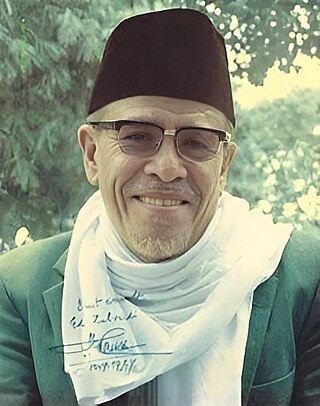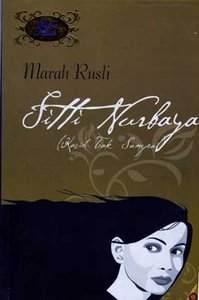Plot
Tuan Direktur presents a chronological plot, divided into twelve chapters. It follows Jazuli, who leaves his hometown of Banjarmasin to go to Surabaya in Java and become a gold merchant. He is quickly able to earn great wealth. However, this causes the once devout and humble Jazuli to become arrogant and materialistic. He calls himself "Tuan Direktur" and surrounds himself with sycophants Kadri, Margono, and Hajji Salmi. He tries to buy Jasin's land to build a factory, but is refused.
Kadri uses Jazuli's belief in spirits to control him, manipulating his boss to fire numerous employees – including Fauzi, who is able to become a successful businessman with Jasin's help. In an effort to eliminate Jasin, Kadri calls the police to the latter's house, claiming that Jasin is holding clandestine, anti-government meetings. When the police come, Jazuli, who has come to Jasin's house to try and buy the land, is arrested with a number of other people.
After two days in holding, Jazuli is released but unable to enjoy his former arrogance, having been counselled by Jasin while in jail. When he sees Fauzi become a rich yet humble man, Jazuli is sent into a depression. He falls ill and does not recover, while Jasin and Fauzi live happily.
Writing
Haji Abdul Malik Karim Amrullah, better known as simply Hamka, was the Sumatran-born son of a devout Muslim who viewed local traditions as hindering the progress of religion – his father's opinions influenced his. After becoming a scholar of Islam, he travelled often, including to Java.Tuan Direktur reflected Hamka's Islamic worldview and was likely derived in part from his experiences while travelling.
At the time Tuan Direktur was written, Surabaya was one of the richer cities in the Dutch East Indies, serving as both a port into the colony and as a stopping point for trade traffic headed to Australia. The city's wealth was decisively contrasted with the fate of the lower classes, who were not benefited by this trade. Writing for the Indonesian Department of Education and Culture, Putri Minerva Mutiara, Erli Yetti, and Veni Mulyani wrote that this may have influenced Hamka to set his story in the city.
Themes
Mutiara, Yetti, and Mulyani found that Tuan Direktur contrasted the arrogant Jazuli, referred to in the title as "Mr Director", with the more humble Jasin. Jasin spends more time praying as he becomes richer, and is willing to aid another man in entering business. His access to wealth, in their opinion, brings him closer to Allah. Thus, they surmise that the novel's moral is that an arrogant person will find sorrow, but one who is humble and prays to God will find happiness.
Abdul Rahman Abdul Aziz, writing in 2009 on Hamka's Islamic interpretations, notes several aspects of Islamic teaching which are reflected in Tuan Direktur. He wrote that the novel reflected Islamic values of simplicity as a way to overcome lust, warning that, although hard work is necessary, one should not become focused on collecting wealth. Aziz, citing a passage where Jasin tells another man to sell an expensive shirt and use the money to buy shirts for less wealthy persons, further found that the novel reflected a concept of brotherhood; humans are meant to work together to overcome difficulty and not focus on their own needs. Likewise, material wealth should not be considered as important as a wealth of friends and acquaintances. A final point he identifies in the novel is that one living in the modern era should not hold superstitions.

Malay was first used in the first millennia known as Old Malay, a part of the Austronesian language family. Over a period of two millennia, Malay has undergone various stages of development that derived from different layers of foreign influences through international trade, religious expansion, colonisation and developments of new socio-political trends. The oldest form of Malay is descended from the Proto-Malayo-Polynesian language spoken by the earliest Austronesian settlers in Southeast Asia. This form would later evolve into Old Malay when Indian cultures and religions began penetrating the region, most probably using the Kawi and Rencong scripts, some linguistic researchers say. Old Malay contained some terms that exist today, but are unintelligible to modern speakers, while the modern language is already largely recognisable in written Classical Malay of 1303 CE.

Abdul Malik Karim Amrullah, better known by his pen name Hamka was an Indonesian ʿālim, philosopher, writer, lecturer, politician and journalist.

Indonesian literature is a term grouping various genres of South-East Asian literature.

Mohd Faizal Musa, also known under the pen name Faisal Tehrani, is a Malaysian author and playwright. Due to the frequent writing and ideas he was known as a controversial person. He is the author of many books and literary works of various lengths, including stage plays. National Laureate Anwar Ridwan praises of Faisal's writing "conscious of high literature and full of vision."

The Overseas Minangkabau is a demographic group of Minangkabau people of Minangkabau Highlands origin in Central Sumatra, Indonesia who have settled in other parts of the world. Over half of the Minangkabau people can be considered overseas Minangkabaus. They make up the majority of the population of Negeri Sembilan and Pekanbaru. They also form a significant minority in the populations of Jakarta, Bandung, Medan, Batam, Surabaya and Palembang in Indonesia as well as Kuala Lumpur, Malacca, Penang, Singapore and Brunei Darussalam in the rest of the Malay world. Minangkabaus have also emigrated as skilled professionals and merchants to the Netherlands, United States, Saudi Arabia and Australia. The matrilineal culture and economic conditions in West Sumatra have made the Minangkabau people one of the most mobile ethnic group in Maritime Southeast Asia.

Salah Asuhan is an Indonesian novel by Abdul Muis originally published in 1928 by Balai Pustaka. It is widely considered one of the best examples of early modern Indonesian literature.

Sitti Nurbaya: Kasih Tak Sampai is an Indonesian novel by Marah Rusli. It was published by Balai Pustaka, the state-owned publisher and literary bureau of the Dutch East Indies, in 1922. The author was influenced by the cultures of the west Sumatran Minangkabau and the Dutch colonials, who had controlled Indonesia in various forms since the 17th century. Another influence may have been a negative experience within the author's family; after he had chosen a Sundanese woman to be his wife, Rusli's family brought him back to Padang and forced him to marry a Minangkabau woman chosen for him.

Tengku Amir Hamzah was an Indonesian poet and National Hero of Indonesia. Born into a Malay aristocratic family in the Sultanate of Langkat in North Sumatra, he was educated in both Sumatra and Java. While attending senior high school in Surakarta around 1930, Amir became involved with the nationalist movement and fell in love with a Javanese schoolmate, Ilik Sundari. Even after Amir continued his studies in legal school in Batavia the two remained close, only separating in 1937 when Amir was recalled to Sumatra to marry the sultan's daughter and take on responsibilities of the court. Though unhappy with his marriage, he fulfilled his courtly duties. After Indonesia proclaimed its independence in 1945, he served as the government's representative in Langkat. The following year he was killed in a social revolution led by the PESINDO, and buried in a mass grave.

Belenggoe is a novel by Indonesian author Armijn Pane. The novel follows the love triangle between a doctor, his wife, and his childhood friend, which eventually causes each of the three characters to lose the ones they love. Originally published by the literary magazine Poedjangga Baroe in three instalments from April to June 1940, it was the magazine's only published novel. It was also the first Indonesian psychological novel.

Atheis is a 1949 Indonesian novel written by Achdiat Karta Mihardja and published by Balai Pustaka. The novel, using three narrative voices, details the rise and fall of Hasan, a young Muslim who is raised to be religious but winds up doubting his faith after dealings with his Marxist–Leninist childhood friend and an anarcho-nihilist writer.

Dian jang Ta' Koendjoeng Padam is a 1932 novel by Sutan Takdir Alisjahbana. It was published by Balai Pustaka.

Di Bawah Lindungan Ka'bah is the 1938 debut novel of the Indonesian author Haji Abdul Malik Karim Amrullah (1908–1981). Written while the author worked in Medan as the editor of an Islamic weekly magazine, the novel follows the doomed romance of a young Minang couple from different social backgrounds. Generally praised for its simple yet eloquent diction, the novel has been twice adapted into film, first in 1977 and then in 2011.

Tenggelamnja Kapal van der Wijck is an Indonesian serial and later novel by Haji Abdul Malik Karim Amrullah published in 1938. It follows the failed love between Zainuddin, a mixed-race man, and Hayati, a pure Minang woman.

Fakih Usman was an Indonesian Islamic leader and politician of the Masyumi Party. He twice served as the Minister of Religious Affairs under the cabinets of Abdul Halim and Wilopo from January until September 1950, and again from 1952 until 1953. In his early years, Fakih was criticized by conservative Muslims for his involvement with the modernist Islamic Muhammadiyah organization, though he is remembered fondly by the group. Born to a merchant and his wife in Gresik, Dutch East Indies, Fakih studied with his father and at a series of pesantren until the 1920s.

Abisin Abbas, better known by his pseudonym Andjar Asmara, was a dramatist and filmmaker active in the cinema of the Dutch East Indies. Born in Alahan Panjang, West Sumatra, he first worked as a reporter in Batavia. He became a writer for the Padangsche Opera in Padang, where he developed a new, dialogue-centric style, which later spread throughout the region. After returning to Batavia in 1929, he spent over a year as a theatre and film critic. In 1930 he joined the Dardanella touring troupe as a writer. He went to India in an unsuccessful bid to film his stage play Dr Samsi.

The Indonesian Malaysians are Malaysian citizens of Indonesian ancestry. Today, there are many Malaysian Malays who have lineage from the Indonesian archipelago and have played an important role in the history and contributed to the development of Malaysia, they have been assimilated with other Malay communities and are grouped as part of the foreign Malays or anak dagang in terms of race. The Malaysian census does not categorize ethnic groups from the Indonesian archipelago as a separate ethnic group, but rather as Malay or Bumiputera.

Kawan Bergeloet is a collection of short stories written by Soeman Hs and first published by Balai Pustaka in 1941. It contains twelve stories, seven of which were previously published in the magazine Pandji Poestaka, as well as an introduction by Sutan Takdir Alisjahbana. These stories are generally humorous in nature, and presented with a diction that shows strong east Sumatran influences.

Soeman Hasibuan better known by his pen name Soeman Hs, was an Indonesian author recognized for pioneering detective fiction and short story writing in the country's literature. Born in Bengkalis, Riau, Dutch East Indies, to a family of farmers, Soeman studied to become a teacher and, under the author Mohammad Kasim, a writer. He began working as a Malay-language teacher after completing normal school in 1923, first in Siak Sri Indrapura, Aceh, then in Pasir Pengaraian, Rokan Hulu, Riau. Around this time he began writing, publishing his first novel, Kasih Tak Terlarai, in 1929. In twelve years he published five novels, one short story collection, and thirty-five short stories and poems.


















